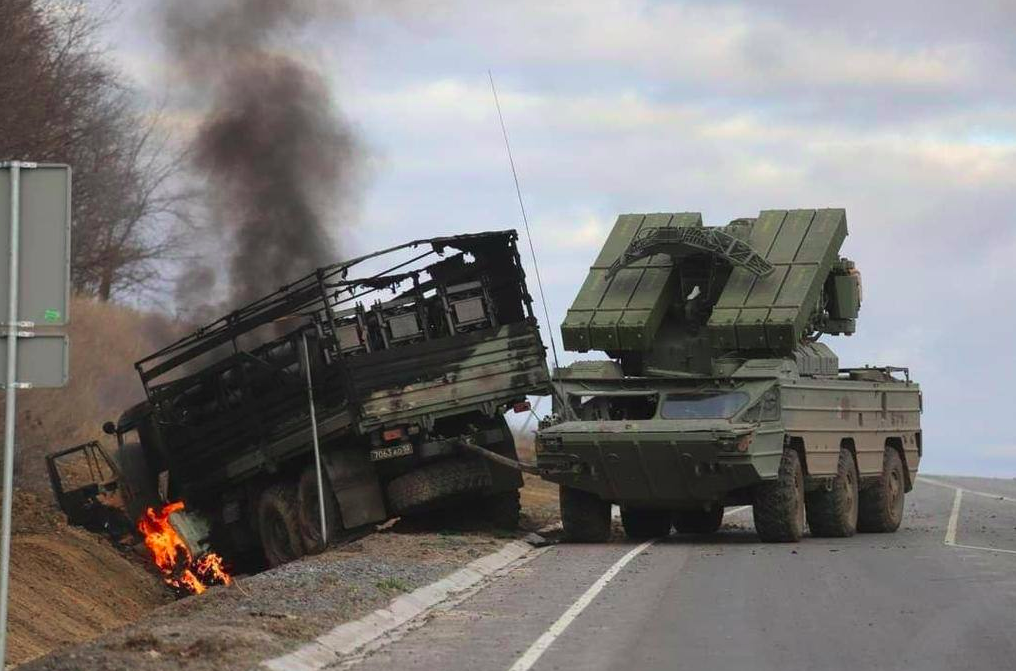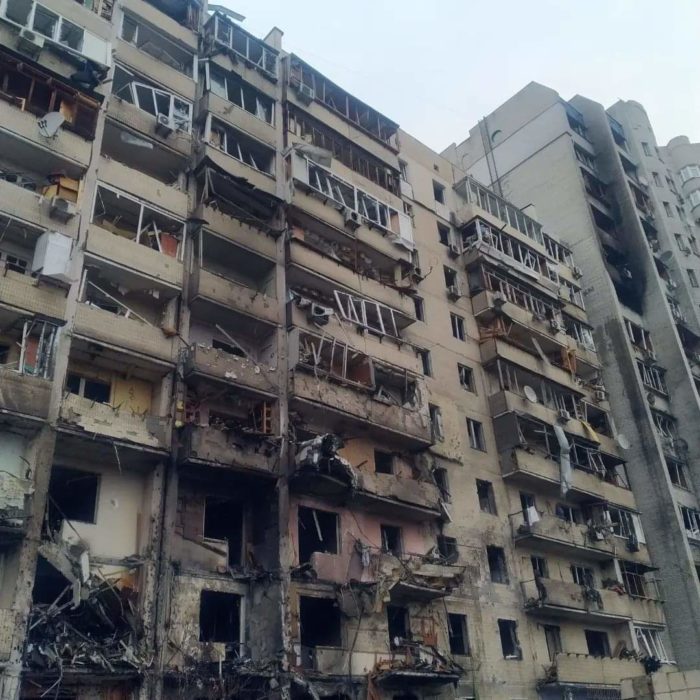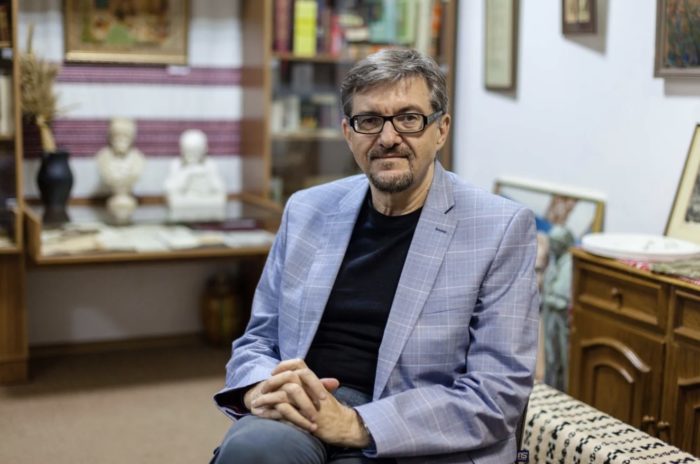Imagine a contemporary French President ordering the French army to occupy the German Saarland, and then say:
“Germany is an anti-French project constructed by British authors.” ... “There has been no Germany for a long time! Saarland is French land. And all of Germany will be part of France – there will be no Germany.”
This is precisely what is going on in Russian-Ukrainian relations. The first phrase is a direct quote from Putin’s article “On the Historical Unity of Russians and Ukrainians,” published in July 2021. I have only switched Germany for Ukraine and France for Russia to bring the message closer to home for Europeans and the world. The second phrase is a statement by Deputy Chair Pyotr Tolstoy of the Russian State Duma.
The contemporary Russian-Ukrainian war started in 2014 with the Russian annexation of Crimea and subsequent occupation of the cities of Donetsk and Luhansk in the east of Ukraine. The war of 2014 can be traced back dozens of years to the Russian destruction of the Ukrainian state in 1920, to the Holodomor genocide in 1932-1933 and, in an earlier era, to the massacre of the Ukrainian Cossack capital of Baturyn and destruction of their state by Russian forces in 1709. Not one tome should be written (and many already have) for an accurate description of Russian-Ukrainian relations.
In this brief essay, I will explain only one particular thesis; namely, the contemporary Russian-Ukrainian war is not a conflict of interest that can be solved by talks and compromise, rather it is an existential conflict where one of the parties must change its very nature. Either Ukraine must give up its right to sovereignty and independence, or Russia must give up its centuries-long ambitions for empire and control over the “sphere of influence”. An analysis of pervasive political – and media – messaging by the Russian government, set against Ukrainian sovereignty and key points in Ukrainian history, demonstrates this.
Russia still treats Ukraine as its colony. Talks are impossible until Moscow learns the dialog of equal parties
In Putin’s thinking, an invasion of Ukraine would not be an attack on a sovereign state but a justified reclamation of Russia’s sphere of influence from “Western foreign influence.” This ill-conceived logic is further demonstrated by the words of Russian popular political commentator Sergei Mikheev. He took great pains to outline for his Russian audience why it is time for Eastern Slavs – headed by Russia – to conduct a “sacred war” against the West. He cannot believe that Ukrainians have their own will, saying they are simply deceived and used by the West “as sheep”:
“Currently we observe an attempt to destroy Eastern Slavic Orthodox peoples to which Russians, Ukrainians and Belarusians belong. This destruction is conducted by the West … In this situation, contemporary Ukraine is just cannon fodder. You [Ukrainians] are sheep that could be spurred to war with Russia [by the West] … The Western civilization is based on total deception and destruction. This is how they achieved their success.”
The point I want to highlight – openly expressed in Putin’s July article and reiterated in his 21 February TV address to Russians – is that for Russian leadership there is no Independent Ukraine as an equal partner:
“Ukraine is ‘part of our own [Russian] history’” and “‘vassals’ with which Moscow should not negotiate at all.”
After “hour of imperialism and chauvinism” Putin recognizes his Donbas puppets, sends in troops
Independent Ukraine means the end of the Russian “empire.” Therefore, Independent Ukraine is unacceptable for Putin
This view may be strange for the European audience of the 21st century, where empires obsessed with the idea of occupying other countries no longer exist. However, judging from Putin’s behavior and statements, he believes the contemporary Russian state is essentially the continuation of the Russian Empire and should not drop its imperial ambitions.
Western media often describe Ukraine as “a former Soviet republic.” But paraphrasing Ukrainian essayist Mykola Riabchuk:
It is very misleading to neglect the impact of the earlier history of the Russian Empire on Ukrainian history and current developments. In fact, while Soviet Ukrainian history lasted for 70 years, the Ukrainian struggle against the Russian Empire lasted for 200 years.
Let me provide some details that are essential for the Ukrainian perspective, although only part of the whole picture.
It should not be underestimated that the Russian Empire was only proclaimed after the takeover of Ukraine in 1708, which at the time was a widely-acknowledged autonomous Cossack state and an ally of the King of Sweden in the Great Northern War against the Tsardom of Muscovy (historical Russia).
Formerly under the joint protectorate of the Polish-Lithuanian Commonwealth and the Tsardom of Muscovy, the Ukrainian Cossack state had de facto sovereignty, with a powerful military and strong foreign relations, as well as its own unique language and culture.
Baturyn, the capital of the Cossack state, was comparable in the 18th century to Kyiv at that time. However, it never regained its standing after the horrific massacre carried out by Muscovy in 1708.
Muscovite (Russian) forces slaughtered all 15,000 inhabitants, including women and children, and burned the town to the ground. Between 1995 and 2021, archaeologists have explored more than 5,000 square meters of land in Baturyn. Their findings fully support data from historical documents
that recorded the carnage of these civilians.
The destruction of the Cossack (Ukrainian) capital, the greatest military arsenal and food store in Ukraine – upon which Sweden’s king relied – enabled Russia to defeat Sweden in the Battle of Poltava in 1709. This was a battle that changed the course of the Great Northern War and secured Russia’s place among the great powers of Europe.
Further conquest of Ukraine by Moscovy brought access to the Black Sea ports and Ukraine’s rich harvests, thus ensuring Russia’s economic power. Control of these very same ports and harvests are the very same economic goals of Russia today. This would ensure their food supply dominance in Europe, in addition to their oil and gas dominance.
From a symbolic perspective, the origin-tale of the Russian Empire was influenced by the pan-Slavist narrative clearly formulated in the 19th century, which emphasized the alleged unity of Slavic nations; as well as the pan-Russian version of the unity of Ukrainians and Belarusians, ostensibly led by Russia. This narrative is still at the center of Russian chauvinism today.
Kyiv, which is now the capital of Ukraine, was portrayed as the “Mother of Rus cities,” because it was the capital of the eastern-Slavic medieval kingdom of Kyivan Rus. It is from the powerful state of Kyivan Rus that Russia modeled its name when the Russian Empire was officially proclaimed by Peter the Great in 1721.
Today, with Ukraine’s Independence, the Russian narrative collapses. That ancient Slavic capital Kyiv is now beyond Russian borders – in altogether another state
. Ukrainian textbooks, as well as those of Russia, both treat Kyivan Rus as their ancestral state, but the fact is that Kyiv is located in Ukraine and that Moscow was only founded in the 12th century, several centuries after Kyiv.
This heavily threatens Moscow’s symbolic significance, making it an outlier of the Slavic mental map. This is why an independent Ukraine threatens the notion of a Russian Empire, both geopolitically and symbolically.
A few Russian liberal historians, such as Andrey Zubov, advocate for an alternative liberal Russia, claiming that the majority of young Russians support this view. However, the current Putin government continues to conduct imperial policy and views Independent Ukraine as a threat. Only recently, Putin’s police did not hesitate to arrest even those very few individuals who protested on the streets of Moscow, 20 February, with banners “No war with Ukraine.”
Russians must recognize their crimes against humanity by the example of Germany to demonstrate readiness for talks
Another key point is that the USSR was created after the destruction of the Ukrainian 1917-1920 free republic. Although society at that time had different political views, including socialist and communist, thousands of peasant uprisings followed the 1920s, after the Ukrainian republic lost its war against Russian Bolsheviks, not willing to participate in the collective farms.
These uprisings were finally stopped by the Holodomor, meaning “murder-by-famine.” Stalin’s artificially-induced famine took at least four million lives of Ukrainians over the winter of 1932-1933. All grain and food storages were forcefully taken from village peasants and sold abroad at record volumes. Without any food, millions did not survive the harsh winter.
What I most want to highlight is that Ukraine joined the USSR not voluntarily but was subsumed by the Soviet state, or even more accurately was conquered.
These topics deserve more comprehensive coverage in English and other languages. Although some modern research
by learned historians and academics has been published, the widespread inclusion in school textbooks everywhere and global media recognition is still missing.
For members of the EU, especially France and Germany, it often seems strange that Ukrainians and Russians can not simply sit down at the negotiating table and find mutual reconciliation.
I would like to respond through the words of Hannes Adomeit, German political scientist at the Institute for Security Policy at Kiel University, who said:
“[Moscow power] does not take unnecessary risks. Impervious to logic or reason, it is highly sensitive to logic of force. For this reason, it can easily withdraw – and usually does when strong resistance is encountered at any point. If the adversary has sufficient force and makes clear his readiness to use it, he rarely has to do so.”
Little has changed in the current-day politics of Putin. To prove this, one has only to analyze Kremlin political declarations – they were always a means for military ends and expansion of territorial control.

Nothing but a strong military can stop Russian brutality and crimes against humanity
More clear evidence of the Kremlin's policy is found in its constant straightforward deception and denigration of human lives in order to augment the desired military effect.
It is now routine in Donbas for Russian soldiers to hide artillery among civilian houses and fire at Ukrainian soldiers to provoke return fire, and then accuse the Ukrainian military of “genocide in Donbas.”
The latest example is the “evacuation” of civilians from Russia-occupied Donbas starting on 18 February to create panic and make a media show that the occupied territories are preparing for an alleged Ukrainian offensive – which Ukraine cannot and does not want to do. This evacuation was combined with fabricated explosions to create anxiety and spur willingness to fight among the Russian population.
Russian invaders use methods of combat prohibited by humanitarian law by placing children and women on the armored vehicles to cover them, seizing social infrastructure, wearing the uniform of the Ukrainian military, police and rescuers - General Staff says. For example, 23 Ukrainian police vehicles were captured and used by Russian saboteurs in Odesa region. Another three ambulances were used by Russian saboteurs in Kyiv.
https://twitter.com/MFA_Ukraine/status/1498281934799179778
Such policies, however, are not a surprise when one remembers special barrier troops in the Red Army during WWII that were used not to fight with the enemy but to go after Soviet soldiers and shoot anyone who would try to retreat.
The other historical example that the Russian government denies, but which is very likely true, is the Russian apartment bombings in 1999 that killed 367 people. They were most likely organized by the Russian FSB to accuse “Chechen terrorists” and fabricate a pretext to start the invasion of Chechnya. Alexandr Litvinenko who first wrote about this was fatally poisoned by the Russian FSB. The story is properly analyzed in David Satter’s book The Less You Know, The Better You Sleep: Russia’s Road to Terror and Dictatorship under Yeltsin and Putin.
In contemporary Ukraine, it is also routine for Russian occupiers both in Donbas and Crimea to capture civilians and torture them with electrocution and beatings just for expressing pro-Ukrainian political sentiments – as harmlessly as in a Facebook post.
One such illegal prison is described in detail by Ukrainian journalist and former prisoner of occupiers Stanislav Aseyev in his memoir The Torture Camp on Paradise Street, centered on the infamous illegal prison Izolyatsia in occupied Donbas.
And finally, the most recent example, is the story of political prisoner Oleh Prykhodko, published by Yevhen Chepelianskyi, 19 January 2022:
"In captivity since October 2019, Oleh was tortured with electricity for days, drenched in cold water, and handcuffed for hours with his arms twisted behind his back. He is kept in solitary confinement without a bed. Being sick, this 64-year-old man must stand barefoot on the cold concrete all day… The man is in a terrible state of health, but is not given any treatment. His kidneys will soon fail, and he has terrible pain in his urinary system. With a hypocritical smile, the prison 'doctors' say that 'everything is fine.' Oleh is tortured because of his position on Ukraine ...
Today he is required to renounce his ideology, and write what is dictated, that he fought in some hot spots [against Russians], which they will dictate to him. Oleh’s daughter saw his terrible condition. He was very swollen. 'I am being killed, I will not survive, Oleh told her. They won't even give my body to you.'
They have demonstrated this daily through volunteer military training, in which thousands participated to be ready to support the regular army should the worst scenario begin. They demonstrate it now by bravely resisting the invasion of a dominating military force.
Ukrainians know well what awaits them should they allow Russian occupation. There are enough lessons both from history and from contemporary reality. That is why they are ready to fight back for their state. They demonstrate this daily in heavy fighting and self-sacrifice. Only in Kyiv, in the first 24 hours after the aggression started, 18,000 volunteers enlisted to the territorial defense and received weapons to defend their city.
But there is still a way to end the war with minimal casualties as well as the Russian chauvinist “empire”. The way is to demonstrate Western strength now, according to the recommendation of George Kennan, to make the Russian military withdraw. Should Russia encounter strong international and first of all military pressure, then it will be doomed to further decay as a self-imagined empire and increasingly subject to internal transformation to a free state.
Ukrainians knew their military was strong but now they are doing even better than expected! More believe Ukraine will win the war against Russian on the fourth day of war than before it started. Still, Ukraine needs a lot of support to win with fewer human casualties.
Polititank is a Portuguese think tank dedicating itself to thinking and debating national and international politics, publishing articles and essays in Political Science and International Relations.









